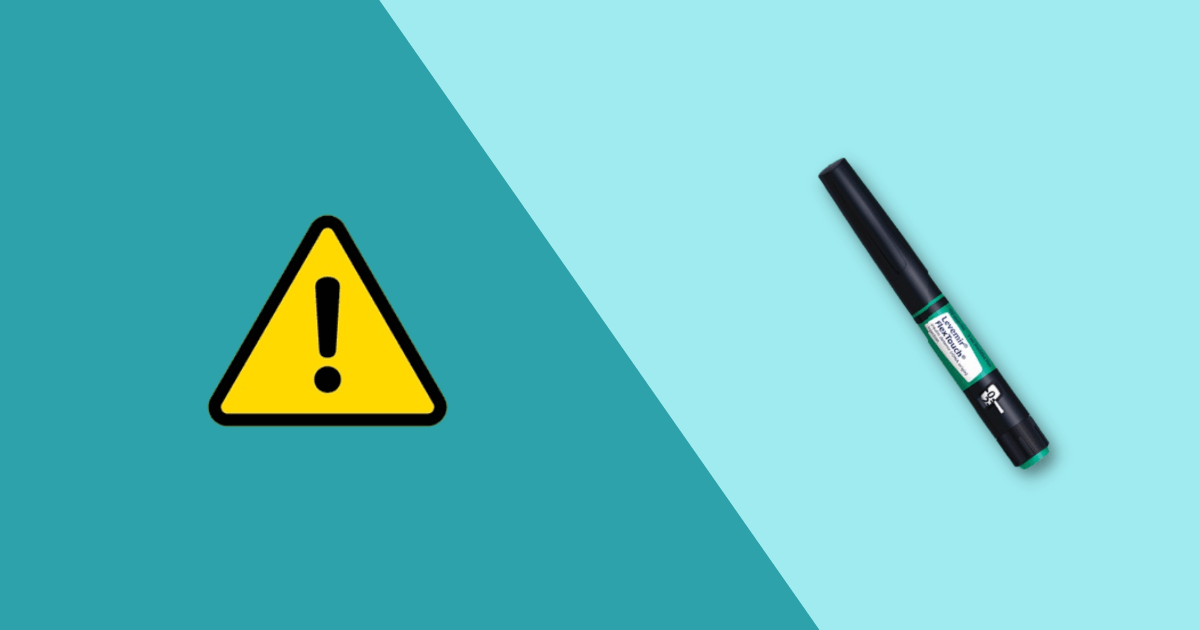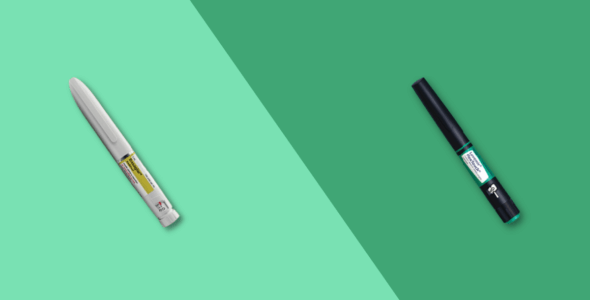Levemir side effects and how to avoid them
Table of contents
Levemir is a brand-name FDA (Food and Drug Administration) approved medication manufactured by Novo Nordisk Inc. It is classified as a long-lasting insulin and is used to treat diabetes. While Levemir is generally well tolerated, there are some potential side effects that people should be aware of. The most common side effects of Levemir include injection site reactions. Less common but more serious side effects can include serious allergic reactions.
Learn more about the side effects of Levemir and what you can do to avoid them.
What is Levemir?
Levemir is a prescription medication used to lower high blood sugar levels (hyperglycemia) in adults and children with type 1 diabetes and type 2 diabetes mellitus. It’s a type of insulin that works in the same way as the insulin your body produces. A key difference, however, is the fact it’s long-lasting.
The active ingredient in Levemir is called insulin detemir, a type of synthetic (man-made) insulin that works in the same way as the insulin your body makes naturally. The only key difference is that insulin detemir has been designed to be longer acting than natural insulin, so it works over a longer time period.
When you inject Levemir under your skin, the insulin detemir is released into your bloodstream. It travels around your body in your blood and helps your cells absorb sugar. It can be active for up to 24 hours, so it can cover your insulin needs over the course of a full day.
Levemir dosage
Levemir is available in injection form as 3 mL Levemir FlexTouch prefilled insulin pens and 10 mL multiple dose vials.
Levemir is taken by injecting it under your skin (subcutaneous injection) into the thigh, upper arm, or abdomen using either a syringe or a pre-filled FlexTouch self-injecting pen. You typically inject Levemir once every 24 hours at the same time each day. Allow Levemir to reach room temperature before injecting a dose.
You are advised to read the medication guide provided with this medicine for the drug information and patient information, and always speak with your healthcare provider for medical advice about any changes to your dose so they can monitor and evaluate your condition.
Levemir side effects
The most common possible side effects of Levemir in clinical trials include:
- Injection site reactions such as itching, rashes, skin thickening, or pits forming in your skin (lipodystrophy)
- Weight gain
- Allergic reactions that can cause swelling of your face, tongue, or throat
- Difficult or painful urination
- Swelling (edema) of your hands and feet
Levemir can cause more serious side effects, including:
- Serious allergic reactions to the medication that may be life-threatening and can cause anaphylaxis – skin rash, trouble breathing, fast heartbeats, feeling faint, or swollen face, tongue, or throat
- Your blood sugar falls too low to dangerous levels (severe hypoglycemia). Keep a glucagon kit, glucose tablets, or fruit juice available in case of severe low blood sugar
- Hypokalemia (low potassium level)
If you experience any of these serious side effects, stop taking Levemir and seek medical attention immediately. You are encouraged to report the negative side effects of prescription drugs to the FDA. Visit www.fda.gov/medwatch, or call 1-800-FDA-1088.
Does Levemir affect the kidneys?
Levemir should not affect the kidneys, but kidney problems are common in those with diabetes.
Does Levemir cause hair loss?
Levemir is not associated with hair loss, but insulin resistance, which is associated with diabetes, may cause hair loss.
Does Levemir cause weight gain?
Levemir can cause weight gain, a common side effect of all types of insulin. Levemir causes weight increases in those with type 1 or type 2 diabetes but less than other long-acting insulins.
Does Levemir cause mood swings?
No, Levemir does not cause mood swings. Levemir may cause severe low blood sugar and result in changes in mood, such as anxiety.
Levemir drug interactions
Levemir can interact with other medications, including:
- Antibiotics such as cinoxacin, ciprofloxacin, enoxacin, norfloxacin, and ofloxacin
- Thiazolidinedione medications (TZDs) such as pioglitazone and rosiglitazone, taken to treat diabetes
- Any other diabetes medications – metformin, glipizide, or other insulin products
- Angiotensin II receptor blockers such as candesartan, losartan, and valsartan
- Angiotensin-converting enzymes (ACE) inhibitors such as captopril, enalapril, and perindopril
- Antidepressants, including monoamine oxidase inhibitors and selective serotonin reuptake inhibitors – phenelzine, selegiline, and sertraline
- Beta 2-stimulants taken to treat asthma – salmeterol, formoterol
- Beta-blockers taken to treat high blood pressure – propranolol, sotalol
- Diuretics taken to make you lose water and salt, usually to treat high blood pressure – bumetanide, furosemide
- Estrogen containing drugs, including birth control and hormone replacements
- Fenofibrate taken to lower blood triglyceride levels
- Thyroid hormones taken to treat thyroid gland disorders – levothyroxine, liothyronine
Before taking Levemir, be sure to tell your doctor about all of the medications you are taking to ensure they are safe to take at the same time.
What is the best time of day to take Levemir?
Take Levemir once daily with dinner or at bedtime, or twice a day in the morning, and then with dinner, at bedtime, or 12 hours after your morning dose.
Why do you take Levemir at night?
Levemir is a long-acting insulin that reduces fasting blood glucose levels more effectively with less nighttime hypoglycemia compared to other insulins.
Is Levemir safe during pregnancy?
Animal studies show an increased risk of fetal damage. The importance of this is not fully understood in humans. Further testing is needed to investigate the effects of Levemir during pregnancy.
Levemir warnings & precautions
Don’t take Levemir if you:
- Are allergic to the active ingredient insulin detemir
- Are allergic to any of the other ingredients in Levemir
- Have diabetic ketoacidosis – a condition where high blood sugar causes high levels of ketones to build up in your body
Talk to your doctor before taking Levemir if you:
- Are taking any of the medications that could interact with Levemir
- Have heart failure
- Are pregnant or are planning to become pregnant
- Are breastfeeding or are planning to breastfeed – This medication passes into breast milk
You should always check with your doctor or pharmacist before taking any medication, including Levemir, to ensure it is safe for you.
How to avoid Levemir side effects
The best way to avoid side effects is to take Levemir as directed by your doctor. Follow your doctor’s instructions carefully and do not take more or less than prescribed.
If you experience any side effects, talk to your doctor or pharmacist. They may be able to recommend ways to help reduce or prevent some of the side effects.
1. Stick to the recommended dosage
Take your prescribed dose of Levemir as recommended by your healthcare professional. Do not take more or less than prescribed.
2. Monitor your blood sugar levels
If you have diabetes, it is important to monitor your blood sugar levels closely while taking Levemir. Check your blood sugar levels as directed by your doctor and report any changes to your doctor immediately.
3. Drink plenty of fluids
Drink eight to 10 glasses of water or fluids every day to help prevent dehydration, which can make side effects worse.
4. Avoid alcohol
Avoid drinking alcohol while taking Levemir, as it can increase your risk of hypoglycemia.
5. Don’t skip meals
Eating regular meals and snacks will help to prevent low blood sugar levels (hypoglycemia).
6. Check your feet
If you have diabetes, check your feet for any cuts, sores, or redness regularly. Tell your doctor if you experience any problems with your feet while taking Levemir.
7. Know the signs and symptoms of Levemir side effects
Signs and symptoms of side effects include injection site reactions and allergic reactions. If you experience any of these symptoms, speak to your doctor for medical advice.
8. Tell your doctor about all medications you’re taking
Be sure to tell your doctor about all other medications you’re taking, including over-the-counter drugs, vitamins, and herbal supplements, as they can interact with Levemir.
9. Get regular medical checkups
It is important to get regular medical checkups and monitor your medical conditions. Your doctor will monitor your side effects and may adjust your dose of Levemir as needed.
Medically reviewed
A medical professional has reviewed this article.


Jamie Winn, PharmD
Jamie Winn, PharmD
Dr. Jamie Winn received his Doctor of Pharmacy in 2002 from the University of South Carolina College of Pharmacy, Columbia, SC. Jamie is a medical reviewer for NiceRx.



